Although this was my first HTML Webpage assignment, I found it quite simple and fun to make. However, I did have a bit trouble figuring out how to insert a link, but I figured it out with the help of w3schools.
Week 1: Response to Short History of the Internet and Long Live the Web – Sebastian Lau (Chen)
While reading the two passages there were some parts that stuck out to me in terms of how it connected to The Machine Stops by E.M Forster. After reading these passages I felt like my knowledge of what the Internet is has increased and has made me view it as something more dangerous than I would have otherwise thought.
In Short History of the Internet the author writes about how the internet is formed of many nodes that connect to each other, with the purpose of having a less linear communication system in the sense that if one node goes offline, it doesn’t mess up the whole system. While of course, this has helped make the Internet more reliable as it is hard to shut down completely, I feel like this fact is a cause of at least some concern. From what I understand about the way the nodes work if there ever is the need to completely eradicate the Internet for whatever reason then it would be almost impossible without a heavily coordinated effort. I think that is somewhat concerning because there are so many ways that the Internet could affect our lives, and it is getting harder and harder to get away from it. I would kind of compare it to how the Machine permeates everybody’s life and it’s almost impossible to get away from it. The people couldn’t stop it because they either didn’t care or because the Machine was so big that it was almost impossible to stop anyways. As a result, the Machine became ingrained in everybody’s life and when it started malfunctioning nobody would be able to survive if they tried to adapt to the new world.
When I was reading Long Live the Web I found the idea of a less free Internet to be disturbing. There is already evidence of this with China where many sites get censored to stifle anti-Chinese media and while there is a problem of “fake news” in the U.S I think I would rather have more access to lots of information even if there is a chance for it to be false. I would liken the censorship of the Internet to the censorship of the outside world in The Machine Stops. Because the outside world is barred to the people they never get to know about it and are content with their version of the world because they never experienced anything else. On a somewhat unrelated note, I feel like this is a good argument for traveling in terms of experiencing new cultures and that people who are willing to learn more about the world will tend to be less close-minded.
Week 1 – HTML Portfolio Page – Eberhardt, Madison
Week 1: My about_me pages – Milly Cai
Here is the link to my about_me pages:
https://imanas.shanghai.nyu.edu/~yc2966/week01/about.html
I’m sorry for the link above does not truly work as there’s unknown error appearing and I’m still working on this problem.
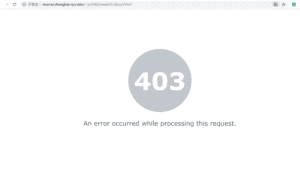
The correct file should be like this:
about page
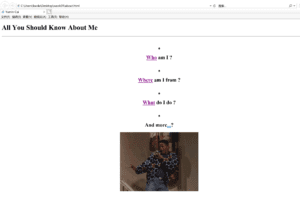
who am I
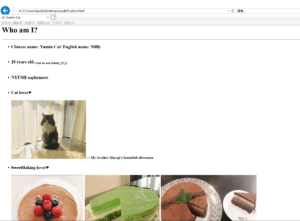
where do I from
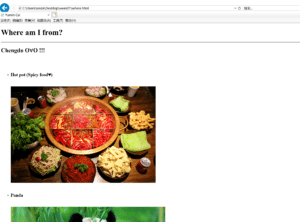
know more(joking page 404)
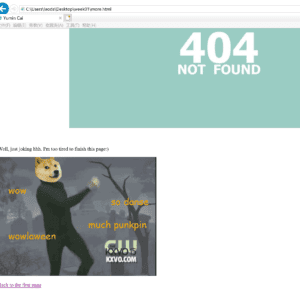
Basically, I include four pages in this assignment: about(first) page with links to the other three, who am I page to introduce my basic information and hobbies with some pictures, where do I from to introduce my hometown, and know more page to make a 404 joke. Each subpage contains a link to go back to the about page.
Week 1: Response to “Long Live the Web” and “A Network of Fragments” – Milly (Yumin Cai)
“Long Live the Web” by Tim Berners-Lee let me reconsider about the internet: like, should we regard the internet as a new form of the human society in the modern world or simply a tool for information?
It’s very interesting to learn how does “internet” and “web” be different from each other, as the web is applied for all kinds of uses and is only accessible with the internet, which is an open supporting system. Making clear of this concept would be important for us to understand how the internet function. Just like Berners Lee emphasizes “freedom” of the web and internet, which means “Freedom from being snooped on, filtered, censored and disconnected” (82). Although we have free access to the internet, the truth is that we are actually influenced or even controlled by some important figures such as the government or some internet related companies. Just like the examples that Lee argues in the article: Apple’s “itunes:” replacing “https:” or information monitoring by the government… In fact, similar examples are not hard to find besides the mentioned ones in the article. For instance, the isolation of internet and web services in China would be a famous case to support this argument. The Internet has no longer been a place of freedom.
However, comparing with the universal standard for free internet that Lee supports, my consideration is that how we define or, in other words, to regard the internet for the current and future society. Following Lee’s logic, the internet still plays the role of an information exchanging tool rather than a new form of human society. Like it is described in “A Network of Fragments”, the effect of the internet exists everywhere in our life. Also as Lee says, the internet is an open way for us to access the web where information is available for communication. The way that the internet deal with data and information just changed our traditional view of social activities and understanding of the world. It has deeply rooted in the current world, which makes it form up part of the essence of modern culture. Should it be still just a tool? If the internet is a tool, then we’ll probably set up proper rules to regulate its usage. But if not, then fragmented methods like laws to protect privacy or allocation for free speech would never be enough to regulate culture or society.
Fiber lines, mobile phone apps or “http:” websites; physical or intangible…the way that internet appears do not really matter. The internet will not die, however, “what would it be” and “what would we human be” are the questions that matter. Thus, I think the question I asked, in the beginning, is quite important for us to think about is not only because we are now sitting in comm lab, but also because we are now living in a culture that will die without internet.